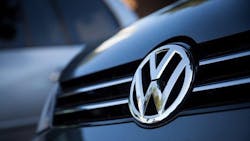Volkswagen AG (IW 1000/7) reached a tentative settlement with auto dealerships for their losses from the diesel-cheating scheme affecting more than a half million cars in the U.S.
The dollar value of the agreement covering 652 dealerships wasn’t disclosed during a hearing in San Francisco federal court over efforts to fix the diesel-powered vehicles rigged to cheat emissions tests or get them off U.S. roads. In a statement, lawyers for the dealerships said VW had agreed to buy back unfixable used vehicles under the same terms as a buy-back plan for consumers and independent dealers.
Volkswagen said that it agreed to make cash payments and provide additional benefits to the dealers to resolve their claims.
U.S. District Judge Charles Breyer, who last month gave preliminary approval to the carmaker’s settlement covering 480,000 Volkswagens with 2.0-liter engines, is pressing for a solution for vehicles with 3.0-liter engines. Those models include the Volkswagen Touareg, Porsche Cayenne and Audi Q5.
Breyer told the company to submit a plan for fixing the 3-liter engines and proof that it works to U.S. regulators by Oct. 24 and report back to him on Nov. 3.
Almost a year after the cheating was made public, VW still doesn’t have an approved fix for any of the 562,000 cars still polluting U.S. roads. The $14.7 billion agreement with car owners and the government calls for buying back or fixing 2.0-liter models. Volkswagen is also on the hook for $603 million that the company agreed to pay 44 states, and it faces more state government claims and investor class actions in the U.S., lawsuits in Germany and South Korea and possible criminal penalties in all three countries.
Fraud Accusation
Auto dealers and resellers sued VW in class actions alleging fraud and false advertising. Volkswagen was also sued by a few franchise dealerships this year who accused the carmaker of fraud for installing the pollution-control cheating devices in diesel vehicles and sticking them with continuing losses by failing to fix the problem for months.
Dealers are angry because they invested heavily in new, large stores in hopes of seeing the brand sell 800,000 vehicles a year, the goal set by former Volkswagen CEO Martin Winterkorn. Volkswagen’s namesake brand sold 349,440 cars and light trucks in the U.S. last year.
VW brand’s sales fell almost 14% this year through July while industrywide deliveries rose 1.3%, according to researcher Autodata Corp. VW’s share of the market dropped to 1.7% from 2.1% a year earlier, Autodata said.
Fines, Penalties
Since the U.S. Environmental Protection Agency has yet to approve any of VW’s proposed remedies for the cars, it could be years before any of the vehicles are taken off U.S. roads, a possibility that may increase fines and penalties against VW. The company has earmarked 18 billion euros (US$20.3 billion) to cover the costs of the scandal.
As Volkswagen attempts to put its scandal in the trunk, Robert Bosch GmbH, VW’s main supplier of software that manages diesel engines, is fighting at least some of the claims that it shares blame for the devices used to cheat emissions tests. After plaintiffs filed an amended complaint on Aug. 18 accusing Bosch of playing a key role in the development of the technology, Bosh denied claims that its employees were part of the conspiracy.
Bosch will defend itself against the “wild and unfounded” allegations, the German component manufacturer said in a filing in the litigation consolidated before Breyer. Bosch, a defendant in some of those lawsuits, isn’t part of VW’s U.S. settlement.
By Kartikay Mehrotra, Alan Katz and Margaret Cronin Fisk
About the Author
Bloomberg
Licensed content from Bloomberg, copyright 2016.
